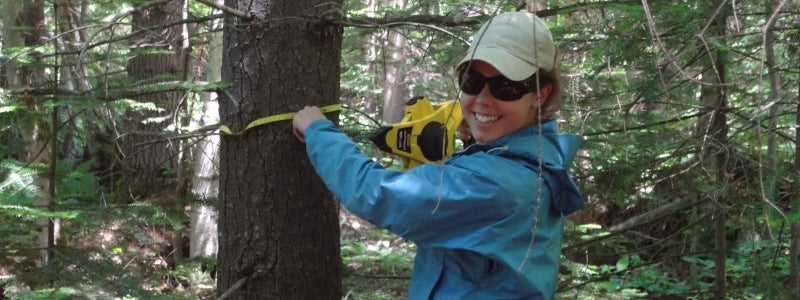
Moores splits her time behind a desk and in the field.
One of the toughest challenges for any student headed into graduate work is finding a way to somehow gather their previous work and experience, combine it with their current passions, and ask the important questions that will bring them all together. For Master of Environmental Studies student Kelly Moores, it was this challenge that ultimately led her to the University of Waterloo and an exciting opportunity to track climate change in our most beautiful National Parks.
“I have been very interested in the environment since I was 14,” says Moores, whose father is a teacher and encouraged her curiosity about nature. “I worked at an ecology camp and ever since then I have known that it was what I wanted to do.”
However, knowing and doing are two different things. Following her 2010 undergraduate degree in Environmental Science at Acadia, the Nova Scotia native was at a crossroads. She knew she wanted to be in a position to work in Canada’s protected environments but it wasn’t until a chance visit to the University of Waterloo that she discovered how to make this a reality.
Her brother was studying at Waterloo and while visiting him she began investigating academic opportunities with the Department of Environment and Resource Studies. Upon meeting with department Chair Dr. Stephen Murphy, he agreed to supervise her thesis, and she settled on an academic home.
“I was interested in protected areas, conservation, and climate change… but I needed help narrowing down a thesis question,” Moores explains. “I also wanted my research to have a field work component. I wanted to be hands on.”
Today, Moores has managed to check those boxes. When she is not here at Waterloo working on her research, she is trekking through the bush with her GPS in Bruce Peninsula National Park collecting data for her research on scenario-building for climate change.
“I take what is actually happening in the park and look at it through a lens that will help park managers develop a policy that will take climate change into consideration,” Moores says. “Protected areas are such an important resource for mitigating the effects of climate change. They provide a refuge for animal populations and they act as a migration corridor. They are also important for research because they have the historical records. You can see the long-term trends.”
Besides fulfilling her academic potential, the National Park system provides another benefit; a workspace as beautiful as can be imagined. “I love how very blue the water is. It’s like being in a tropical place, but you’re not,” Moores says of the Bruce Peninsula. “It has really great trails and the staff up there has been really helpful and really supportive.”